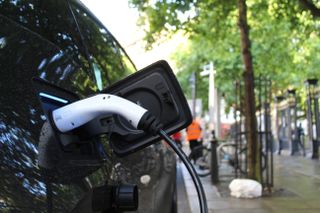Vodafone to build private 5G network for Ford's electric vehicle plant
Private 5G will aid battery development

Vodafone is to install a private 5G network at Ford’s factory in Essex in the hope that advanced wireless connectivity can accelerate and refine the production of electric vehicles.
The two companies are part of a consortium that has received £65 million worth of public funding as part of the government’s plan to aid the development and commercialisation of 5G technologies in the UK.
Specifically, the E:PriME (Electrified Powertrain in Manufacturing Engineering) facility at Ford’s Dunton Campus focuses on the creation of batteries and electric motors which can require 1,000 welds.
- UK 5G speeds slower than rest of world
- 5G in the UK: everything you need to know
- Operators reach £1bn shared rural network deal
Ford electric vehicle 5G
This means each electric vehicle product generates half a million pieces of data every minute. The 5G network will help capture and analyse this data to optimise the process.
“Connecting today’s shop floor requires significant time and investment,” said Chris White, Ford 5GEM project lead. “Present technology can be the limiting factor in reconfiguring and deploying next-gen manufacturing systems. 5G presents the opportunity to transform the speed of launch and flexibility of present manufacturing facilities, moving us towards tomorrow’s plants connected to remote expert support and artificial intelligence.”
“5G mobile private networks act as a springboard for organisations, allowing them to rethink the way they do business,” added Vinod Kumar, Vodafone Business CEO. “In this case, [mobile private network] technology makes the factory of the future possible. It allows machines and computing power to coordinate in real time, improving precision, efficiency and safety. We’re excited to help Ford plan for the future of its business.”
Although 5G networks will allow operators to offer enhanced communications to consumers and reduce operating costs, the real value is believed to be in enterprise services. The market is currently served by Wi-Fi, Bluetooth and other LPWAN standards, but 5G promises to address many shortcomings.
Are you a pro? Subscribe to our newsletter
Sign up to the TechRadar Pro newsletter to get all the top news, opinion, features and guidance your business needs to succeed!
Unlike previous generations of mobile connectivity, the ultrafast speeds, superior capacity and ultra-low latency of 5G means mission-critical applications can be powered by cellular technology for the first time. 5G will improve reliability, availability and reduce delays.
Some deployments will use commercially available networks, but private 5G allows the customer to define the specifications of the 5G network and affords a greater degree of control. Private 5G networks can be built with or without the help of a mobile operator.
Both businesses and operators are convinced of the potential of 5G – especially in fields such as Manufacturing, logistics, transport, utilities and the public sector
Research from Nokia suggests two thirds of businesses will seek help from a mobile operator when adopting 5G services, providing carriers with a lucrative new source of revenue that will increase the rate of investment on next-generation infrastructure.
Earlier this week, Toyota and Nokia partnered on a private 5G network deployment at the car manufacturer’s facility in Fukuoka, Japan.
However a separate study from Omida found that telcos are missing out on major contracts because they are focusing solely on the connectivity element of 5G projects rather than working with industries to identify business problems and vertical services.
- Here are the best 5G phone deals for June 2020
Steve McCaskill is TechRadar Pro's resident mobile industry expert, covering all aspects of the UK and global news, from operators to service providers and everything in between. He is a former editor of Silicon UK and journalist with over a decade's experience in the technology industry, writing about technology, in particular, telecoms, mobile and sports tech, sports, video games and media.
